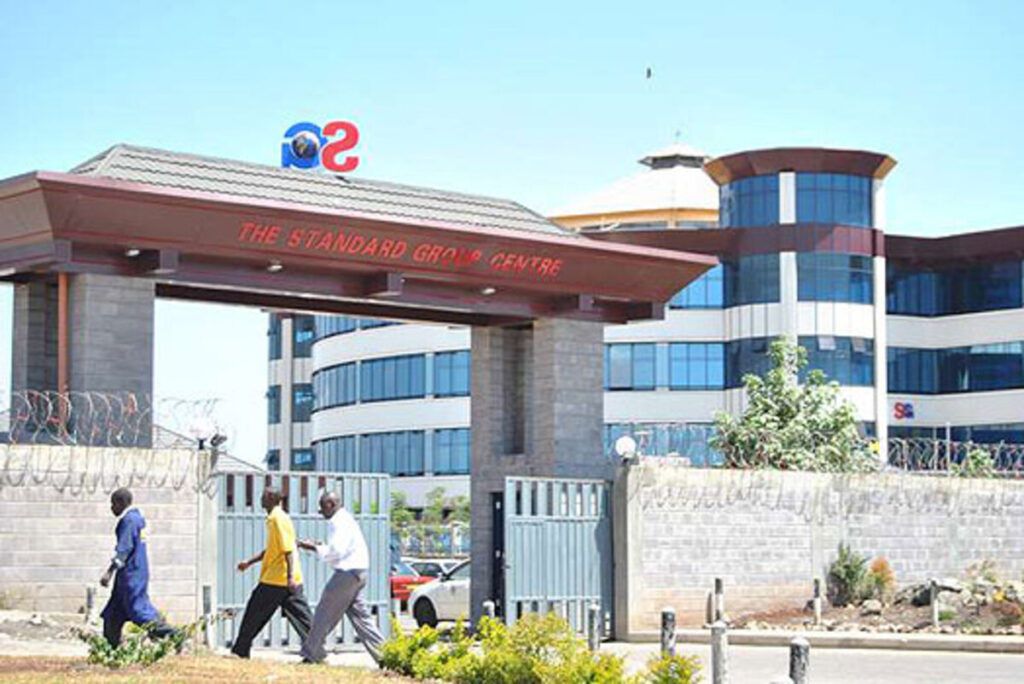Former employees of Standard Group staged a demonstration on Thursday demanding their unpaid salaries. The protest took place at the media company’s headquarters in Nairobi.
The workers, who have gone without pay for up to ten months, gathered to voice their frustrations. Many carried placards highlighting their financial struggles.

The Kenya Union of Journalists (KUJ) has strongly backed the workers’ demands for their dues. Furthermore, the union has condemned Standard Group’s failure to meet its financial obligations to staff.
“We cannot stand by while our members suffer,” said a KUJ representative. Additionally, the union warned of more actions if the company fails to address the situation.
The demonstration follows months of financial turmoil at the media house. Meanwhile, Standard Group has conducted significant layoffs due to mounting losses.
Some former employees shared their personal struggles during the protest. Moreover, they described how the delayed payments have affected their lives.
“I can’t pay my children’s school fees,” said one former journalist. Subsequently, many others echoed similar stories of financial hardship.
The media company’s management has faced increasing pressure to resolve the crisis. Nevertheless, previous attempts to address the salary arrears have yielded little success.
Labour laws in Kenya require prompt payment of workers’ dues. However, Standard Group has allegedly defied these regulations consistently.
The situation has drawn attention to broader issues in Kenya’s media industry. Consequently, many are questioning the sustainability of traditional media houses.
Several former employees have reported going into debt. In addition, some have lost their homes due to inability to pay rent.
The protest organisers vowed to continue their campaign until paid. Therefore, more demonstrations might follow if their demands remain unmet.
Financial experts point to changing media landscapes as contributing factors. Besides, digital disruption has severely impacted traditional media revenue models.
The company’s cost-cutting measures have not solved its financial problems. Instead, they have led to increased tension with current and former staff.
KUJ has called for government intervention in the matter. Similarly, other media stakeholders have expressed concern about the situation.
Industry observers note this crisis could affect media freedom. Likewise, it raises questions about job security in the sector.
The demonstration highlighted the human cost of corporate financial struggles. Hence, it has sparked wider discussions about workers’ rights.
Some protesters shared how they’ve turned to informal jobs to survive. Accordingly, many have had to completely change their careers.
The media house’s reputation has suffered from this ongoing crisis. Consequently, it faces challenges in maintaining public trust.
Former employees are demanding immediate payment of all arrears. Furthermore, they want assurance against such delays in future.
Standard Group’s management has yet to respond to the latest protest. Meanwhile, stakeholders await their plan to resolve the crisis.
The situation continues to evolve as pressure mounts on the company. Therefore, more developments are expected in coming days.
Industry experts suggest this could lead to reforms in media employment. Moreover, it might influence how media houses manage their finances.
This crisis reflects broader challenges in Kenya’s media landscape. Subsequently, it could trigger industry-wide changes.
The protesters’ stories highlight the impact of corporate decisions on families. Indeed, many described severe personal and professional setbacks.
As the demonstration concluded, organisers promised further action if needed. However, they remain hopeful for a peaceful resolution.
This situation serves as a cautionary tale for media organisations. Thus, it emphasizes the importance of sustainable business models.
The future of Standard Group remains uncertain amid these challenges. Nevertheless, stakeholders hope for a solution that protects workers’ interests.


















